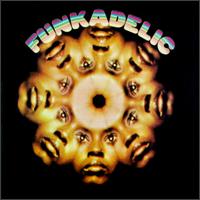
Parliament-Funkadelic is an American music collective of rotating musicians headed by George Clinton, primarily consisting of the funk bands Parliament and Funkadelic, both active since the 1960s. Their eclectic style drew on psychedelia, outlandish fashion, and surreal humor. They released albums such as Maggot Brain (1971), Mothership Connection (1975), and One Nation Under a Groove (1978) to critical praise, and scored charting hits with singles such as "Tear the Roof Off the Sucker" (1975) and "Flash Light" (1978). Overall, the collective achieved thirteen top ten hits in the American R&B music charts between 1967 and 1983, including six number one hits. Their work would have an influential effect on subsequent funk, post-punk, hip-hop, and techno artists of the 1980s and 1990s, while their collective mythology would help pioneer Afrofuturism.
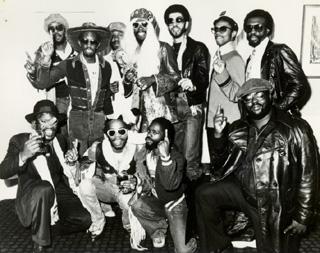
Parliament was an American funk band formed in the late 1960s by George Clinton as a flagship act of his P-Funk collective. Evolving out of an earlier vocal group, Parliament became associated with a more commercial and less rock-oriented sound than its sister act Funkadelic. Their work incorporated Afrofuturism concepts, horn arrangements, synthesizer, and outlandish theatrics. The band scored a number of Top 10 hits, including the million-selling 1976 single "Give Up the Funk ," and Top 40 albums such as Mothership Connection (1975).
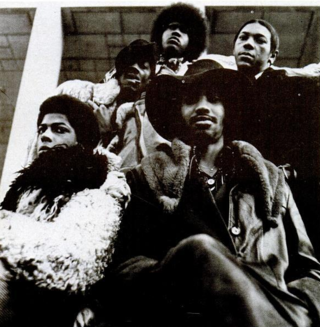
Funkadelic was an American funk rock band formed in Plainfield, New Jersey in 1968 and active until 1982. As one of the two flagship groups of George Clinton's P-Funk collective, they helped pioneer the funk music culture of the 1970s. Funkadelic initially formed as a backing band for Clinton's vocal group the Parliaments, but eventually pursued a heavier, psychedelic rock-oriented sound in their own recordings. They released acclaimed albums such as Maggot Brain (1971) and One Nation Under a Groove (1978).

Free Your Mind... and Your Ass Will Follow is the second studio album by American funk rock band Funkadelic, released in July 1970 by Westbound Records. It charted at No. 92 in the US, the band's highest charting album release until 1978's One Nation Under a Groove, and included the No. 82 single "I Wanna Know If It's Good to You?"

Maggot Brain is the third studio album by the American funk rock band Funkadelic, released by Westbound Records in July 1971. It was produced by bandleader George Clinton and recorded at United Sound Systems in Detroit during late 1970 and early 1971. The album was the final LP recorded by the original Funkadelic lineup; after its release, founding members Tawl Ross (guitar), Billy Nelson (bass), and Tiki Fulwood (drums) left the band for various reasons.
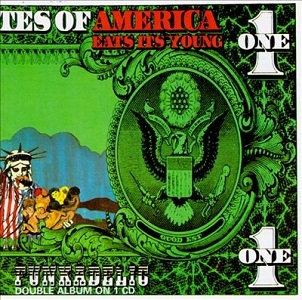
America Eats Its Young is the fourth album by Funkadelic, released in May 1972. This was the first album to include the whole of the House Guests, including Bootsy Collins, Catfish Collins, Chicken Gunnels, Rob McCollough and Kash Waddy. It also features the Plainfield-based band U.S., which consisted of guitarist Garry Shider and bassist Cordell Mosson, on most of the tracks. Unlike previous Funkadelic albums, America Eats Its Young was recorded in Toronto, Ontario, Canada, and in the UK. The original vinyl version contained a poster illustrated by Cathy Abel. The bottom of the poster features the first widespread appearance of the Funkadelic logo, which would appear on the cover of their next album Cosmic Slop.
William "Billy Bass" Nelson is an American musician, who was the original bassist for Funkadelic. He is a member of the Rock and Roll Hall of Fame, inducted in 1997 with fifteen other members of Parliament-Funkadelic.

Cosmic Slop is the fifth studio album by Funkadelic, released in July 1973 on Westbound Records. While it has been favorably reevaluated by critics long after its original release, the album was a commercial failure, producing no charting singles, and reaching only #112 on the Billboard pop chart and #21 on the R&B chart. The album was re-released on CD in 1991.

Let's Take It to the Stage is the seventh album by American funk rock band Funkadelic. It was released in April 1975 on Westbound Records. The album charted at number 102 on the Billboard 200 and number 14 on the R&B Albums.

Hardcore Jollies is the ninth studio album by the funk rock band Funkadelic, released on October 29, 1976 by Warner Bros. Records, their first album to be issued on a major label. It is dedicated to "the guitar players of the world." Originally, the first side of the album was called "Osmosis Phase 1" and the second side was "Terribitus Phase 2." Hardcore Jollies was released one month after Funkadelic's final album for Westbound Records, Tales of Kidd Funkadelic, which was recorded during the same sessions.

Tales of Kidd Funkadelic is the eighth studio album by the band Funkadelic, released in September 1976. It was their final album on the Westbound record label. The tracks were recorded during the same sessions as their first release for Warner Brothers Records, Hardcore Jollies; which was released a month later. Two tracks from Tales of Kidd Funkadelic, the single “Undisco Kidd” and the party anthem “Take Your Dead Ass Home!” have been staples in the band’s live performances since the album’s 1976 release, and can be heard on the 1977 Parliament concert album Live: P-Funk Earth Tour. The album opener “Butt-To-Buttresuscitation” and the song “I’m Never Gonna Tell It” were included in the band’s live shows during the early 2000s. The song "Let's Take It to the People" has been sampled by hip-hop band A Tribe Called Quest for their song "Everything Is Fair", on their album The Low End Theory.

Standing on the Verge of Getting It On is the sixth studio album by Funkadelic, released on Westbound Records, released in July 1974. It is notable for featuring the return of guitarist Eddie Hazel.
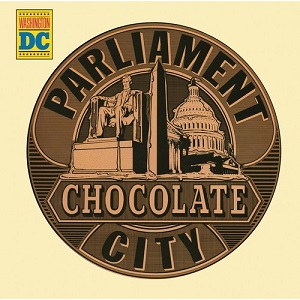
Chocolate City is the third album by the funk band Parliament, released in 1975. It was a "tribute to Washington D.C.", where the group had been particularly popular. The album's cover includes images of the United States Capitol, the Washington Monument, and the Lincoln Memorial in the form of a chocolate medallion, as well as sticker labeled "Washington DC". The album was very popular in the capitol city, selling 150,000 copies alone there.

Love Child is the fifteenth studio album released by Diana Ross & the Supremes for the Motown label in 1968. The LP was the group's first studio LP not to include any songs written or produced by any member of the Holland–Dozier–Holland production team, who had previously overseen most of the Supremes' releases.

Osmium is the debut album of American funk band Parliament, led by George Clinton. The album has a psychedelic soul sound with a spirit of experimentation that is more similar to early Funkadelic than the later R&B-inspired Parliament albums. It was originally released in July 1970 on Invictus Records. The original vinyl release contained a glossy lyric sheet.
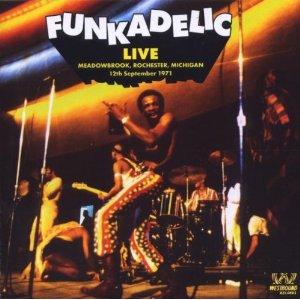
Funkadelic Live: Meadowbrook, Rochester, Michigan 12th September 1971 is a 1996 live release featuring the only official in-concert recording from early in the career of Funkadelic. Westbound Records owner Armen Boladian had decided to record the show without the band's prior notice, for a possible official live album release. Boladian then decided not to go forward with the project. The soundboard recording resided with engineer Ed Wolfram until being unearthed in 1996. The album contains the entire live performance of September 12, 1971, minus approximately three minutes of between-song chatter.

Motor City Madness is a compilation album by the American funk rock band Funkadelic, released in 2003 by Westbound Records. It features a selection of songs previously released on the band's original albums for Westbound from 1970 to 1976. The compilation's 29 tracks span the length of two discs. Music critic Robert Christgau has said that, "for those with the heart for it, this is their most listenable album."
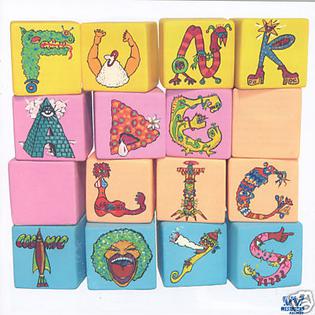
Toys is a compilation consisting of unreleased music by American funk rock band Funkadelic. It was released by Westbound Records in 2008 and consists of previously unreleased sessions recorded during the band's tenure for Westbound. The album was originally scheduled to be released in 2002, but was delayed numerous times, presumably due to legal issues. The CD also features a video clip of the song "Cosmic Slop", which can only be viewed on a PC.

U.S. Music with Funkadelic is a self-titled album consisting of tracks recorded in the early 1970s by the band United Soul with input from members of Funkadelic. The album was released by Westbound Records in 2009, and was licensed by Ace Records for its European release.
